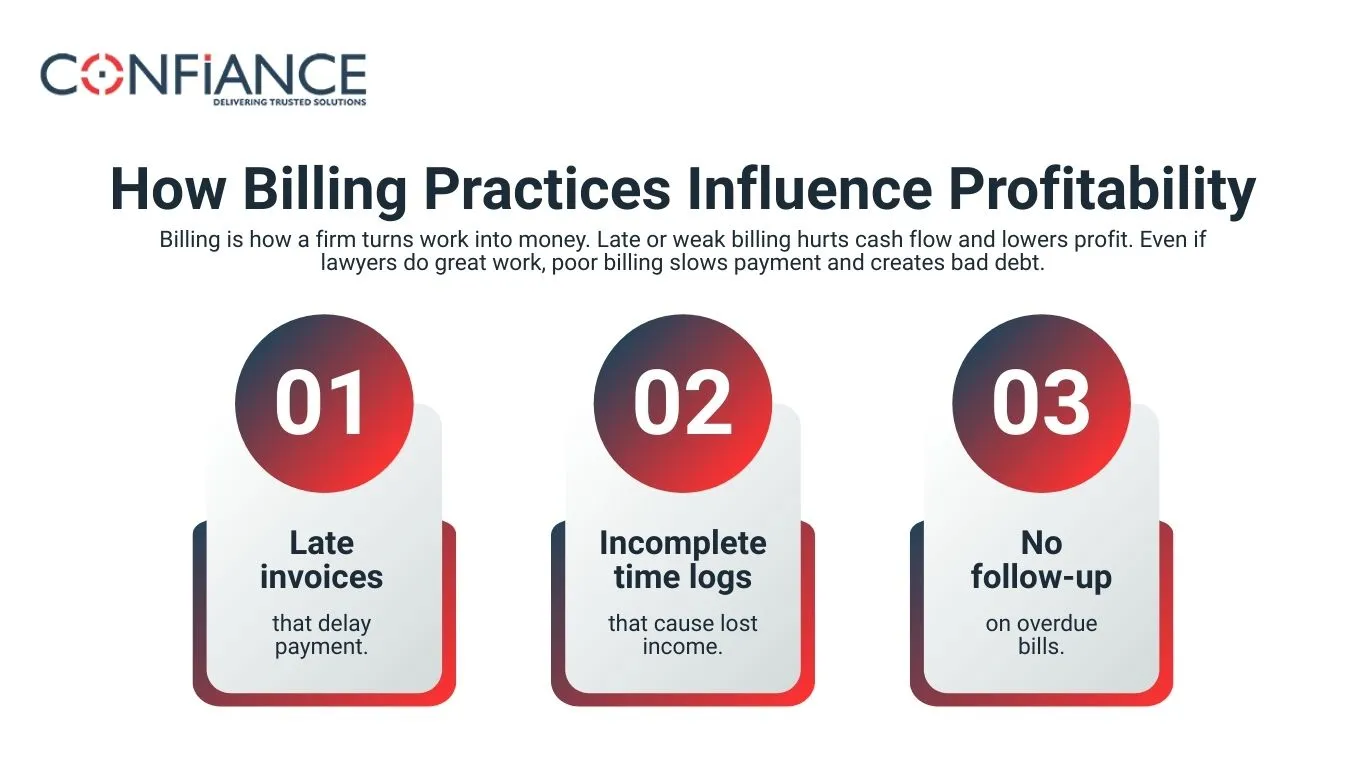
How Law Firm Financial Management Impacts Profitability
Law firms deal with clients, cases, and deadlines. But they also need strong control over money. Law firm financial management is the process of planning, tracking, and using firm funds in a smart way. It affects how much profit the firm makes each year.
A busy firm can still have weak profits if money is not handled well. Missed invoices, high costs, and poor planning all reduce earnings. Good financial management fixes these issues. It helps leaders see problems early and take action before they hurt results.
This blog explains how law firm financial management shapes profit. It covers billing, cost control, budgets, metrics, cash flow, taxes, technology, client selection, and more.
Why Financial Management Matters for Law Firms
A law firm sells knowledge and time. Every hour worked has value. If income and costs are not tracked well, profits can shrink even in good months.
Law firm financial management gives leaders a clear picture of the firm’s money. They can see where it comes from and where it goes. This makes it easier to plan spending and set fair prices for work.
When finances are tracked closely, trends appear. Some practice areas bring more income than others. Leaders can invest in these areas and reduce focus on low-return work. This raises the firm’s profit without adding more hours.
Good financial control also builds stability. If income drops, the firm knows which costs to cut while keeping core services strong.
How Billing Practices Influence Profitability
Billing is how a firm turns work into money. Late or weak billing hurts cash flow and lowers profit. Even if lawyers do great work, poor billing slows payment and creates bad debt.
Common billing problems include:
- Late invoices that delay payment.
- Incomplete time logs that cause lost income.
- No follow-up on overdue bills.

Strong law firm financial management sets clear billing rules. Bills should be sent soon after work is done. Lawyers should record hours daily to avoid gaps. The firm should follow up with reminders when payment is late.
Many firms use billing tools that connect to case systems. This reduces mistakes and speeds up payments. Fast billing means steady cash and higher profit.
Cost Control and Expense Tracking
Profit grows when costs are managed well. Law firms pay for rent, staff, insurance, and other fixed needs. They also pay for travel, court fees, and research tools.
Law firm financial management keeps costs in check by:
- Reviewing all expenses each month.
- Requiring approval for large or unusual costs.
- Comparing vendor prices and contracts.
Controlling costs protects profit. It also reduces the need to raise client fees, which can help keep clients loyal.
The Role of Budgeting in Profit Growth
A budget is a plan for income and spending. Without it, spending can rise too fast and hurt profit.
A good budget in law firm financial management should cover:
- Income targets for each practice area.
- Spending limits for teams and projects.
- Plans for handling changes in seasonal income.
Budgets help leaders choose where to invest money. They prevent cash shortages during slow periods. Budgets should be checked and updated at least every three months.
Tracking Key Financial Metrics
Numbers show how well a firm is doing. Without tracking them, problems can go unnoticed.
Key metrics in law firm financial management include:
- Billable hours per lawyer to track output.
- Collection rate to measure the share of bills paid.
- Realization rate to compare hours worked to hours billed.
- Profit margin to see how much income remains after costs.
Modern systems can display these numbers in real time. Leaders can then act fast if performance drops.
The Link Between Staff Utilization and Profit
Staff utilization is the share of a worker’s time spent on billable work. Low rates mean less income for the same pay.
Firms can raise utilization by:
- Moving admin work to support staff.
- Using tools to automate routine tasks.
- Training staff on time use.
Law firm financial management tracks utilization and finds areas to improve. Better use of staff time increases profit without adding more people.
Cash Flow Management and Stability
Even a profitable firm can face trouble if cash is slow to come in. A large payment that arrives months late can cause stress.
Cash flow planning in law firm financial management includes:
- Checking receivables each week.
- Giving clients easy ways to pay.
- Using retainers for new work.
- Billing long projects in stages.
A steady cash flow means the firm can cover costs, pay staff, and plan for growth without relying on loans.
Tax Planning and Compliance
Taxes affect every firm’s bottom line. Poor planning can cause fines and sudden cash demands.
Tax work in law firm financial management should include:
- Regular reviews with a tax expert.
- Estimates of yearly tax needs.
- Organized records for filing.
Good tax planning avoids surprises and makes better use of cash. It also ensures full compliance with the law.
Technology’s Role in Financial Management
Technology speeds up financial work and cuts errors. Accounting tools, billing platforms, and expense apps all help.
Benefits of tech in law firm financial management include:
- Faster billing with fewer mistakes.
- Instant financial reports.
- Better links between case data and financial data.
Cloud systems give partners access to figures from anywhere. This makes decisions quicker and more informed.
The Impact of Strategic Planning on Profit
Strategic planning sets clear goals for income, costs, and growth.
In law firm financial management, this might mean:
- Choosing practice areas to grow.
- Setting target profit margins.
- Planning for office or tech upgrades.
With a plan, every financial move supports long-term profit.
Managing Debt and Credit
Debt can help a firm grow, but too much hurts profit.
Best practices include:
- Using debt only for investments that earn more than they cost.
- Paying high-interest loans first.
- Reviewing debt levels often.
Debt control is part of strong law firm financial management. It keeps risk low and profit high.
Improving Profitability Through Client Management
Not all clients are equal. Some pay well and on time. Others use more resources than they cover in fees.
Tracking client profit in law firm financial management helps leaders:
- Adjust rates for costly clients.
- Simplify work for certain case types.
- End ties with low-value accounts.
Focusing on high-value clients boosts income without raising costs.
Training Leaders in Financial Skills
Many lawyers know the law but not finance. This can lead to weak money decisions.
Training in law firm financial management teaches leaders to read reports, set budgets, and plan growth. Skilled leaders make choices that protect and grow profit.
Building a Culture of Accountability
Profit rises when all staff care about the firm’s money.
An accountable culture in law firm financial management may include:
- Clear time tracking rules.
- Regular updates on firm finances.
- Rewards for meeting budget goals.
When all staff follow good habits, the whole firm gains.
Regular Financial Reviews
Regular checks keep a firm on track. These reviews compare actual results with the budget.
In law firm financial management, reviews may lead to spending cuts, billing changes, or shifts in staff use. Acting early stops small issues from becoming big losses.
Outsourcing Certain Financial Tasks
Some financial work can be done better and cheaper outside the firm. This includes payroll, bookkeeping, and tax filing.
Outsourcing in law firm financial management frees lawyers to focus on billable work. It also brings in expert skills without the cost of full-time staff.
Law firm financial management affects every part of profitability. It guides billing, budgets, cash flow, client choice, and cost control.
Confiance helps firms track and plan their finances well. We have helped many law firms benefit with stronger margins and face less risk. Profit comes from clear, consistent, and disciplined money management. Contact us now if you want your law firm benefit from the financial management.
FAQs
- What does law firm financial management include?
It covers planning, tracking, and using firm funds. It also includes billing, cost control, budgets, cash flow, taxes, and client profitability. - How can better billing improve a law firm’s profit?
Timely and accurate billing speeds up payments and reduces bad debt. This keeps cash flow steady and boosts profit. - Why should law firms track key financial metrics?
Metrics like billable hours, collection rate, and profit margin show performance. They help leaders act early to fix problems. - How does staff utilization affect law firm revenue?
Higher utilization means more billable work from the same staff. It increases income without adding more employees. - What role does cash flow management play in a law firm?
It ensures the firm can cover costs and pay staff on time. Strong cash flow also supports planned growth. - How does technology help in law firm financial management?
It speeds billing, reduces errors, and gives instant financial reports. This improves decision-making. - Why is client profitability analysis important for law firms?
It helps firms focus on high-value clients and adjust rates for costly accounts. This raises overall profit. - What financial tasks can a law firm outsource?
Firms often outsource payroll, bookkeeping, and tax filing. This saves time and adds expert skills.
